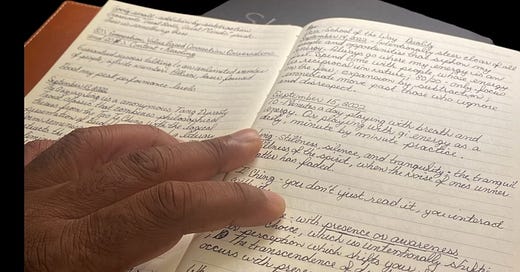Journaling as a Pathway to Life Clarity
Insights from Amanda Stern's Transformative Approach
The year was 1994, and I (Diamond Michael Scott) found myself in a packed ballroom in Chicago, attending a seminar led by legendary thought leader Jim Rohn. Among the many insights he shared, one that has stuck with me over the years was his emphasis on the transformative power of journaling.
According to Rohn, journaling was not just a record-keeping exercise but a vital tool for personal and professional growth, a means of engaging with one's life in a deeper, more meaningful way. Inspired by his words, I picked up the habit of journaling, and it has since become a daily ritual.
Over the years, my journaling practice has become more than just a habit; it's a foundational element of my spiritual journey, closely aligned with my Taoist and Eastern philosophical practice of living a more interconnected and expansive life.
For me, journaling is a way to cultivate a deeper connection with my inner self, particularly during times of loss, confusion, or uncertainty. It has allowed me to process emotions, gain clarity, and draw wisdom from within.
In those moments of introspection, I find journaling to be profoundly cathartic, and I often return to my old entries, seeking the wisdom that only my past self could provide. This practice of self-reflection and inner dialogue is a testament to the Taoist principle of returning to the source, understanding the self, and moving in harmony with life.
Given my deep-rooted appreciation for journaling, I was thrilled to have the opportunity to interview Amanda Stern, a journaling coach dedicated to helping high achievers live value-aligned lives through sustainable journaling practices.
Amanda's philosophy resonates deeply with mine—she believes that journaling is a highly personal endeavor and that there is no one-size-fits-all approach. She has worked extensively with individuals, led workshops, and appeared on various podcasts and radio shows, emphasizing that each of us can find a way to journal that works best for us.
Journaling as a Path to Clarity and Spiritual Growth
During our conversation, Amanda shared how she guides ambitious individuals in using journaling to go deep on their life journey. “Using journaling to explore and deepen our spiritual paths begins with getting comfortable creating space for reflection,” Amanda explained.
“We live in a world where many of us are unaccustomed to sitting quietly with our own thoughts. Before we can truly expect our journaling practice to yield substantial growth, we have to create a foundation for ourselves—a practice of learning to sit with and understand our thoughts and feelings.”
She emphasized that too many people approach journaling expecting immediate insights, and when those don’t come right away, they become discouraged. Amanda encourages her clients to start small, suggesting just five minutes a day to build confidence and comfort with putting their thoughts on paper.
Amanda believes that as one’s confidence grows, so does the depth of their journaling practice. She provides various prompts to help clients navigate their thoughts and facilitate self-reflection and spiritual growth, such as: “What am I feeling right now? What do I really want out of life? How can I make it happen?”
Amanda’s coaching focuses on helping individuals tailor their journaling practices to specific areas where they are seeking growth. She believes that journaling can help us see truths that are often hidden beneath the surface, and those truths, when written in our own handwriting, are hard to ignore. Her approach allows us to engage deeply with our lives, fostering greater self-awareness and spiritual connection.
Amanda Stern
Journaling as a Tool for Value Alignment
Amanda also discussed how journaling can help individuals live more authentically by clarifying their core values. She shared a story from her own coaching experience:
“Through journaling, I came to realize that my frustrations were an indicator of my value of community—of truly seeing and honoring others, of knowing we’re here in life to support each other, not to lift ourselves up by disregarding others.”
In understanding her values, Amanda was able to craft a purpose and values statement that resonates deeply with her soul:
“I cultivate growth through curiosity, creativity, communication, and connection.”
This statement serves as a daily touchstone in her journaling practice, helping her make choices that align with her values and bringing greater joy and authenticity to her life.
Cultivating Gratitude Through Journaling
Gratitude journaling is another key area where Amanda sees a significant impact. She believes that a daily practice of gratitude journaling can connect us with something larger than ourselves, fostering spiritual awareness and transformation.
Amanda shared a story of a client who struggled with anxiety, perfectionism, and shame. By building a gratitude journaling practice, the client learned to appreciate not only what she had but who she was. This practice allowed her to develop self-compassion and transform her relationship with herself, moving from a place of self-criticism to one of acceptance and joy.
Amanda recommends both the “quantity approach” to gratitude journaling, which involves listing as many things as possible to be grateful for, and the “Deep Dive approach,” where one asks: “What am I grateful for? Why am I grateful? How can I show my gratitude?” This latter approach in particular encourages a more profound engagement with gratitude, turning it from a mere exercise into a deeply felt practice.
Overcoming Emotional Blocks Through Journaling
For those who find it difficult to articulate their emotions or access deeper layers of their psyche, Amanda uses strategies like the Feelings Wheel to help expand their emotional vocabulary. She encourages clients to ask themselves, “What am I feeling right now?” and to dig deeper by continually asking “Why?” until they uncover the root of their emotions.
This process not only helps in identifying and understanding emotions but also in recognizing what one needs to feel supported and cared for. The outcome, as Amanda notes, is improved relationships and a more profound spiritual journey.
Mindfulness and Intention-Setting in Journaling
Finally, Amanda shared how journaling can enhance mindfulness and intention-setting, offering prompts like, “What is the most important thing for me to do today?” and “How can I show up as my best version of me?” These prompts help her clients to live more intentional and purposeful lives. She recounted the experience of a client living in a war zone who used these prompts to shift from a survival mindset to one of thriving, underscoring the transformative potential of mindful journaling.
Amanda Stern’s approach to journaling offers a refreshing and accessible perspective that emphasizes authenticity, mindfulness, and personal growth. Her work reminds us that journaling is not about adhering to a rigid format but about discovering a practice that resonates with our unique journey.
For anyone looking to deepen their connection to themselves and the world around them, journaling is a powerful tool—one that, as Amanda demonstrates, can lead to profound transformation and alignment with our true values.
If the daily “Chocolate Taoist” has been a source of wisdom for you then please consider helping me sustain it by becoming a monthly or annual contributor.
For just $6.00/month or $60.00/year, you’ll have the opportunity to share your lived experiences with fellow nomads, fueling discussions that provoke, inspire, and challenge you to deeply explore what is means to be human.
So I hope you will take the plunge today and contribute to my mission of helping human travelers on this life journey.










Thanks so much for this post, D-M. Have we discussed our journals? I'm 16,772 days in, and unlikely to stop now. I wrote about it. too. https://petermoore.substack.com/p/road-to-elsewhere-excerpt-journal-by-peter-moore
As a regular “journalist” myself, this resonates. And there is something even more powerful when one journals, with pen in hand, on paper (preferably an actual journal that feels right to the person). That tactile and sensual experience heightens, for me, the feeling of sacredness to the act of writing. Plus, it slows things down just enough for the mind to both stay engaged but also roam to the outer edges of consciousness where the most fruitful explorations occur.